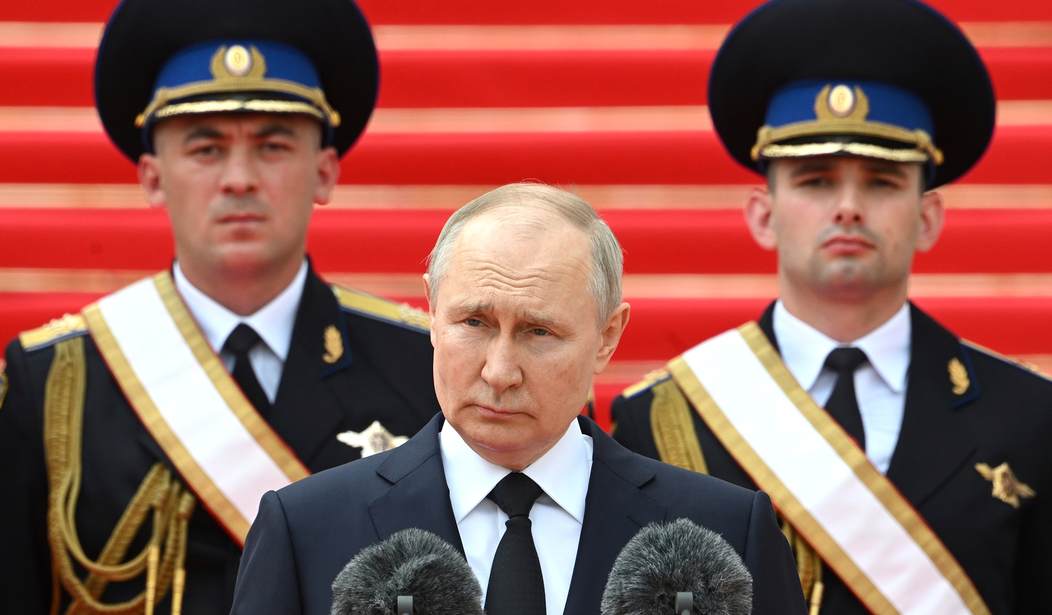There’s a ton of palace intrigue about the anti-Putin coup last weekend. It lasted 48 hours before it stopped, though not because of anything Vladimir Putin did on his part. He allegedly fled Moscow and had whatever security forces prepared for the city's defense. Arguably the capital hadn’t been this spooked since Operation Barbarossa.
With Russia’s military at with Ukraine, this would be the opportune time to launch a coup, and Yevgeny Prigozhin decided to roll the dice on June 23. And some of Russia’s top generals and internal security agencies knew it was coming. So, was it a staged coup or an actual one that failed to succeed due to a lack of manpower? The argument for the deafening silence from Putin’s officials who were privy to this mutiny could cut either way: they wanted Putin gone and said nothing, or knew it was a theatrical production (via NYT):
A senior Russian general had advance knowledge of Yevgeny Prigozhin’s plans to rebel against Russia’s military leadership, according to U.S. officials briefed on American intelligence on the matter, which has prompted questions about what support the mercenary leader had inside the top ranks.
The officials said they are trying to learn if Gen. Sergei Surovikin, the former top Russian commander in Ukraine, helped plan Mr. Prigozhin’s actions last weekend, which posed the most dramatic threat to President Vladimir V. Putin in his 23 years in power.
General Surovikin is a respected military leader who helped shore up defenses across the battle lines after Ukraine’s counteroffensive last year, analysts say. He was replaced as the top commander in January but retained influence in running war operations and remains popular among the troops.
American officials also said there are signs that other Russian generals may also have supported Mr. Prigozhin’s attempt to change the leadership of the Defense Ministry by force. Current and former U.S. officials said Mr. Prigozhin would not have launched his uprising unless he believed that others in positions of power would come to his aid.
If General Surovikin was involved in last weekend’s events, it would be the latest sign of the infighting that has characterized Russia’s military leadership since the start of Mr. Putin’s war in Ukraine and could signal a wider fracture between supporters of Mr. Prigozhin and Mr. Putin’s two senior military advisers: Sergei K. Shoigu, the minister of defense, and Gen. Valery V. Gerasimov, the chief of general staff.
Recommended
And the Federal Security Service of the Russian Federation (FSB) also knew too (via WSJ):
Mercenary leader Yevgeny Prigozhin planned to capture Russia’s military leadership as part of last weekend’s mutiny, Western officials said, and he accelerated his plans after the country’s domestic intelligence agency became aware of the plot.
The plot’s premature launch was among the factors that could explain its ultimate failure after 36 hours, when Prigozhin called off an armed march on Moscow that had initially faced little resistance.
Prigozhin originally intended to capture Defense Minister Sergei Shoigu and Gen. Valery Gerasimov, the chief of Russia’s general staff, during a visit to a southern region that borders Ukraine that the two were planning. But the Federal Security Service, or FSB, found out about the plan two days before it was to be executed, according to Western officials.
Gen. Viktor Zolotov, commander of the National Guard of Russia, a domestic military force that reports directly to President Vladimir Putin, also said authorities knew about Prigozhin’s intentions before he launched his attempt.
“Specific leaks about preparations for a rebellion that would begin between June 22-25 were leaked from Prigozhin’s camp,” Zolotov told state media on Tuesday.
Western intelligence agencies also found out early about the plans by Prigozhin, Putin’s former confidant, by analyzing electronic communications intercepts and satellite imagery, according to a person familiar with the findings. Western officials said they believe the original plot had a good chance of success but failed after the conspiracy was leaked, forcing Prigozhin to improvise an alternative plan.
It's Russia, folks. It’s secretive to all hell, and we might never know if this rebellion was real. Maybe we'll know if Prigozhin turns dead in the next few months.
As we’ve covered, Prigozhin isn’t a military man. He’s a jack of all trades, owning various catering businesses and earning the nickname “Putin’s chef.” He also has dabbled in the technology industries; some of his companies executed Kremlin-supported propaganda efforts. And he also commanded the Wagner Group, a reported 25,000-man mercenary army. This force marched from southern Russia, took over some cities, and came less than 200 miles from Moscow. Prigozhin probably didn’t have enough troops to take over the city, so he ordered a withdrawal order on June 24.
The mutiny was initially reported to be over the alleged attack on his forces by Russian military units and the lies used to justify the war in Ukraine. He cloaked his rebellion as a righteous crusade against Russia’s military leadership. However, it was later reported that he was upset that his forces would be absorbed into the Russian military. He was later granted asylum in Belarus and will not be charged for the insurrection.

























Join the conversation as a VIP Member